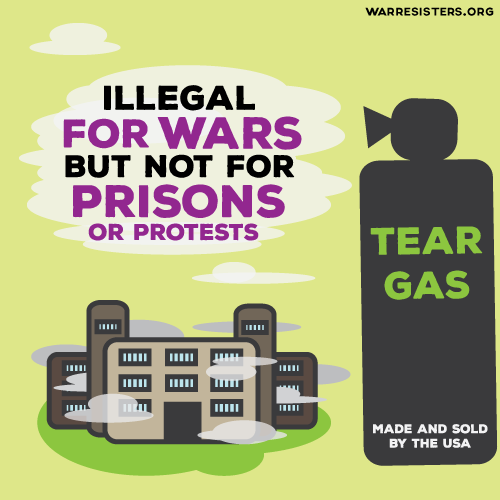End Prison Militarization: Sign Today!
Take Action: End Tear Gas in Prisons
Join The Nation and WRL in demanding that Sally Q. Yates, deputy attorney general of the Department of Justice, take action against human-rights abuses on prisoners involving tear-gas weapons nationwide!
What can you do?
Sign this petition, and join us in demanding that Sally Q. Yates, deputy attorney general of the Department of Justice, take action against human-rights abuses on prisoners involving tear-gas weapons nationwide. Across the United States, the use of chemical weapons—most of them banned in war under the Geneva Protocol—against those confined in jails and prisons has become disturbingly common, and is a yet another example of how militarization is deepening violence on all levels of society. Given the DOJ’s recent recommendations to constrain solitary confinement, this issue should command their attention as well.
To Sally Q. Yates, Deputy Attorney General of the Department of Justice:
We urge you to immediately order investigations, make recommendations concerning, and take action against human rights abuses on prisoners involving tear gas/chemical weapons on both state and federal levels.
SIGN HERE!
In 2013, the War Resisters League put out a call in Critical Resistance’s The Abolitionist—a newspaper that reaches thousands of people in prisons and jails—for stories of having had tear gas or pepper spray used against them. Soon they received over a hundred responses and got permission to republish excerpts—some with explicit permission to use name and location for the sake of challenging tear gas abuse in prisons.
The harrowing experiences they described sound like nothing less than torture.
“I myself have been pepper sprayed about (15) times over the last 8 years of incarceration. I am in a place now where they use chemical agents for a variety of different punishments.” The letter writer went on to list those punishments: Grenades, pepper spray, tear gas, evaporating fog pepper-spray, pepper ball guns, tasers. “All while locked in a cell….I can have (10-20) different inmates tell you horror stories.”
–A man imprisoned in Mount Olive Correctional Complex, West Virginia, 2014.
“They didn’t hit me with the gas until the fight was over and I was already in handcuffs and shackles. The captain sprayed me directly in the face. I immediately began to choke, snot, tears, and saliva spewing from my face. It felt like I was breathing fire. A couple minutes later I began to vomit…. I was not allowed to wash the chemical off until three days later. So for those three days the chemicals continued to burn my flesh.”
–A woman imprisoned by the Colorado Department of Corrections, 2014.
Film created by Freya Powell from excerpts of letters written from those being gassed on the inside, “On fire like hellfire” 2016, Single channel video, 21:16
Reports from prisoner-support and justice groups as well as legal projects all over the US have documented the regular spraying of prisoners with pepper spray, often accompanied by other routine torture practices, such as keeping them bound in a restraint chair covered in copious amounts of pepper spray for long periods of time. In some cases, prison wardens have the authority to directly investigate these abuses and terminate the use of pepper spray against prisoners, but they rarely do. WRL has found documented cases of pepper spray being used against people across the country, from Louisiana State Penitentiary to Mount Olive Correctional Complex in West Virginia to prisons in Pennsylvania, Washington, Illinois, Florida, Virginia, Texas, California, Maryland, Arizona, Georgia, Ohio, Massachusetts, Connecticut, Rhode Island, Michigan, Montana, Missouri, Colorado, and the Virgin Islands.
Companies which produce chemical weapons designed specifically for “enclosed spaces” include Combined Systems, Sabre, and Safariland. They use names like “Cell Buster” in their marketing.
As Daniel Moattar noted in a recent article: “For now, inmates like those at Mount Olive [West Virginia] have no obvious recourse. Producers of tear gas and pepper spray worry more about finding new markets than navigating the law. Even if existing restrictions on the use of force were enforced, the direct use of pain-inducing chemicals on prisoners, including inmates restrained or in solitary, is still minimally regulated and broadly legal.”
Our aim is to break silence on this issue, towards ending chemical weapons use and torture on the inside and everywhere. Join The Nation and the War Resisters League and sign the DOJ petition now!
SIGN & END TEARGAS IN PRISON TODAY!

Need more information? Check out:
Facing Tear Gas in Prison: Resources from WRL
“Prison Are Using Military-Grade Tear-Gas to Punish People” by Daniel Nima Moattar
“Facing Tear Gas: Chemical Weapons Abuse in Prison” by YaliniDream
Share
